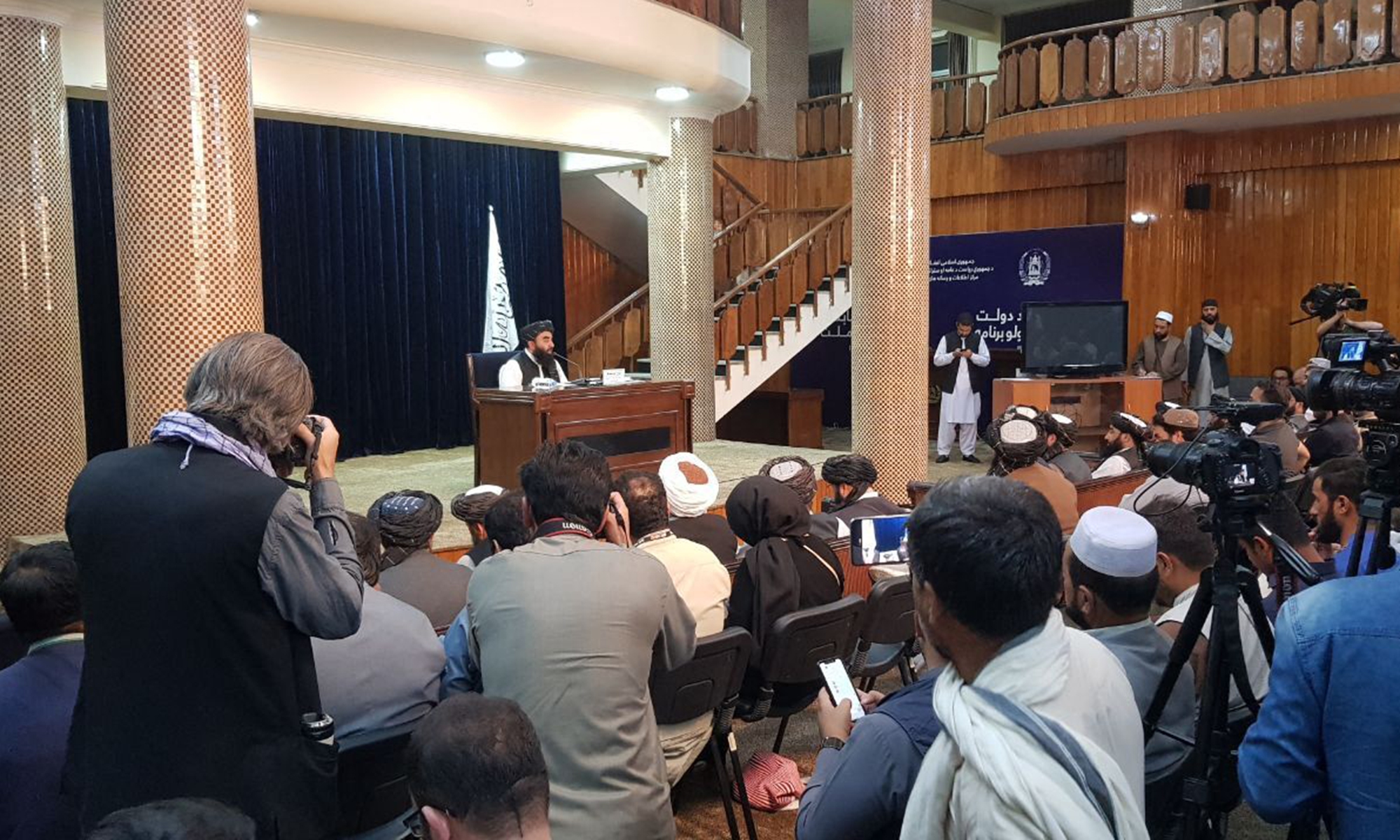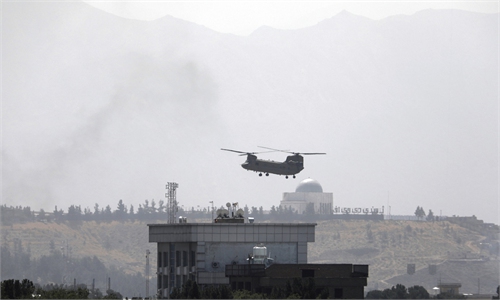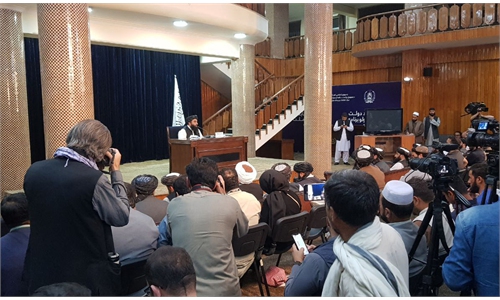China to hold Taliban to honor pledge to cut ties with terrorism after interim govt announcement

Taliban spokesperson Zabihullah Mujahid holds a press conference in Kabul, Afghanistan on Tuesday. Mujahid announced the new government to rule the country. The Taliban announced Mullah Mohammad Hasan Akhund as the interim leader, while giving key positions to some of the movement’s top officials. Photo: AFP
The Afghan Taliban on Tuesday announced key members of its new interim government, whose structure shows the Taliban want to ensure its political dominance and absolute control in the country and means the Taliban at this stage will still prioritize solving internal problems rather than responding expectations from the international community, Chinese analysts said.
Although the key positions of the interim government are dominated by Taliban members, the Taliban might share some grass-root positions with non-Taliban forces in the country, analysts said.
However, some of these Taliban senior members are on the UN sanctions list, which remains a major concern for the international community and also increases difficulty for this interim government to be recognized widely and restore normal international exchanges, said Chinese analysts, adding that China will keep paying attention to the situation and will not change its position of urging the Taliban to keep what was promised.
Mullah Hasan Akhund was announced as prime minister of Afghanistan's caretaker government on Tuesday, with Mullah Abdul Ghani Baradar and Abdul Salam Hanafi named as the acting deputy prime ministers, media reported.
Sarajuddin Haqqani, son of the founder of the Haqqani network designated as a terrorist organization by the US, will be the acting interior minister, the Taliban's main spokesman, Zabihullah Mujahid, informed during a news conference in Kabul. Mullah Mohammad Yaqoob, son of the late Taliban founder Mullah Mohammad Omar, was appointed as the acting defense minister. All these appointments were for an interim government, Mujahid told a news conference in Kabul.
It was not clear what role in the interim government would be played by Mullah Haibatullah Akhundzada, the Taliban supreme leader. He has not been seen or heard in public since the collapse of the Western-backed government and the seizure of Kabul last month, Reuters reported.
"The structure of the new government has shown that the Taliban will dominate all key positions. They want to take control but meanwhile are hoping to present an inclusive image to the world. But they face difficulties in establishing a political structure by both the Taliban and non-Taliban, evident in their postponement in announcing the formation of the interim government," Liu Zhongmin, a professor at the Middle East Studies Institute of the Shanghai International Studies University, told the Global Times on Tuesday.
The Taliban have stressed that it would build an open and inclusive government with a moderate approach and would not become a haven for terrorist organizations.
However, given the complex history and situation in Afghanistan, there still lies a great deal of uncertainty whether it can have a clean cut with their old allies, which means that whether the international community will readily recognize the interim government remains a question, Liu noted.
Zhu Yongbiao, Director of the Center for Afghanistan Studies in Lanzhou University, mentioned that the interim government does not seem to be as "inclusive" as it claimed because the key positions have been taken by members of the Taliban.
Besides Haqqani, the Taliban's supreme leader Haibatullah Akhundzada will be the emir of the "Islamic Emirate of Afghanistan," media reported.
Zhu said that the appointment of the emir makes the new political system in Afghanistan similar to the previous one allowing the emir to live in Kandahar where the administrative work of the country will be shared by the PM and other senior officials.
An expert on counterterrorism and Afghan affairs in Beijing, who asked to remain anonymous, said that "due to the previous terrorist attacks at the Kabul airport, the IS-Khorasan is the terrorist group that the Taliban can decide to cut off, but the Taliban is unlikely to deal with all terrorists in Afghanistan with the same standard."
"The Taliban may keep some terrorists in the country as bargaining chips to make deals with other neighboring countries and major powers worldwide, so it is unrealistic to expect the Taliban to have a clear and absolute cutoff with all terrorists in Afghanistan at this moment," according to the expert.
The East Turkestan Islamic Movement (ETIM) is a major concern for China and the Taliban are aware if it wants to maintain a sustainable ruling of the country, China is the only major power that could provide meaningful support. Therefore, it would take some actions on the matter to meet China's request, the expert said.
Wang Jin, an associate professor at the Institute of Middle Eastern Studies of Northwest University, believed the appointments of the interim government display certain degree of inclusiveness.
An inclusive government for the Afghan Taliban is not what we used to understand as sharing power with other political groups. The Taliban had made it clear previously that it would take the dominant role in the new government and share positions of ministers for basic departments with other political groups, Wang noted, adding that he was a little surprised to see the appointment of Mullah Hassan Akhund as the prime minister of the new interim government as he was on the sanctions list of the UN.
The Afghan Taliban are hoping to join in the UN, but the decision to appoint some on UN's sanctions list as senior officials on key positions in its interim government may create more difficulties for it to communicate with the international community.
Similar to Zhu, Wang said that other senior officials in the new interim government are on the UN sanctions list, which means it will be more difficult for it to deal with the international community and the West.
The nominations for these positions also showed that the Afghan Taliban are taking a realist political view hoping to consolidate the domestic political situation first and later start to gradually promote international relations, Wang said, noting that regardless of the reasons for the decisions of the new interim government, the Afghan Taliban still have a long way to go in either solving domestic problems or dealing with international ties.





